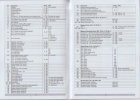By way of a post-script to this thread, at the P'boro show yesterday I had an interesting conversation with someone who has actually spoken directly to somebody on the technical side at M/LGB about this issue with the 20752 Borsig - apparently there was a certain amount of "don't quote me on this, but..." during the conversation, which is why I'm being a little bit cryptic and not naming the parties involved - so please take this information as coming from, as the media would say, "a well-informed source"...

Apparently our speculation earlier in this thread is, basically, correct. M/LGB somehow ended up with a whole batch of MFX decoders that were PARTIALLY faulty, in that one part of the chip was not functioning as it should, but all the rest of it worked fine (a bit of a "Curate's Egg" situation).
This fault resulted in the situation we've been discussing - that the chips work perfectly OK as driving decoders on all protocols (MFX/DCC/DC), but the SOUND facility will only work on MFX/DCC and not on DC. Certain CVs that affect the DC operation can be read, but CANNOT be altered.
Rather than bin the entire batch of decoders, M/LGB decided to use them in a single production run of "budget Borsigs" (apparently some were used in certain Trix locos too), and sell them at a MUCH lower price than they would normally charge for an MFX-chipped sound-equipped loco.
It is important to stress that at no time was there any misdirection or misinformation given out to buyers - M/LGB have always stated from the start that this particular catalogue number item did NOT have sound functions when run on analogue DC, so they've been 100% upfront about it throughout.
So, I think we've got the definitive answer, and I'm happy with that - this specific model (LGB 20752) is confirmed to be a budget-priced "special" that will run on MFX or DCC with full sound, and will run on DC but without the sound. Other newer versions of the same loco model with different catalogue numbers, such as the more recently listed version at a much higher price, have standard and fully-functioning MFX decoders which have sound available on DC.
Jon.
.

